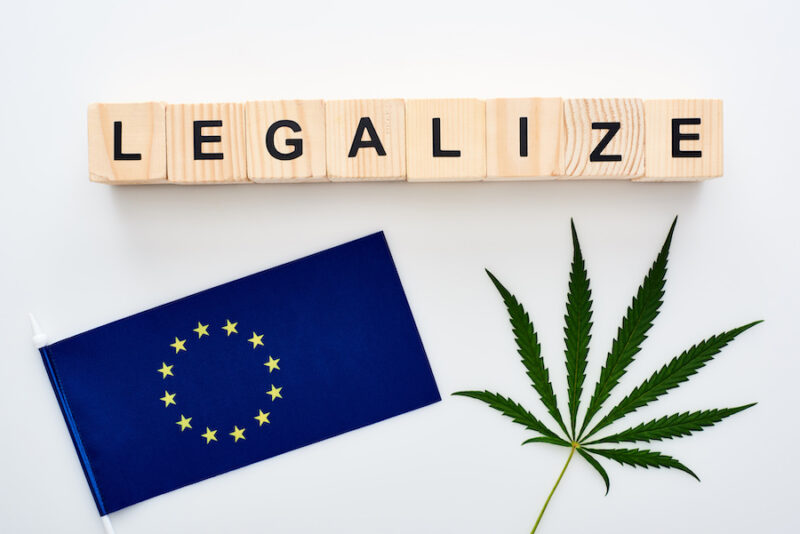In 2024, Europe finds itself at a critical juncture regarding the regulation of cannabis. This trend marks a significant shift in policy across the continent, influencing diverse aspects of society, economy, and governance.
Understanding these dynamics is crucial for policymakers, stakeholders, and citizens alike, as Europe navigates through the complexities of this transition. Now, let us talk about at the process of cannabis legalization on the old continent in depth.
Cannabis Legalization in Europe

Europe presents a diverse picture when it comes to the regulation of cannabis. Countries like the Netherlands have long been known for their relatively permissive stance, while others like Portugal have opted for decriminalization strategies.
In contrast, nations such as Germany are now exploring new regulatory frameworks. These varied approaches reflect the unique cultural, legal, and societal contexts of each nation. To explore these differences, click here.
Legal vs. Decriminalization Models
The distinction between full legalization and decriminalization in Europe is significant.
Legalization involves establishing a regulated market for cannabis, complete with governmental oversight, whereas decriminalization typically means the removal of criminal penalties for possession and use, without establishing a legal market.
Each model carries distinct implications for law enforcement, public health, and societal attitudes towards cannabis use.
Public Health and Safety Considerations

In Europe, the health implications of cannabis use remain a central concern for policymakers. The ongoing research into the substance’s potential therapeutic benefits and risks is crucial for shaping informed policies.
Studies highlighting its efficacy in managing chronic pain, anxiety, and certain seizure disorders have influenced some European countries to adopt medical cannabis programs. Conversely, concerns about the impact of cannabis on mental health, particularly among adolescents and chronic users, have prompted caution.
European health policies are increasingly aligned with harm reduction principles. This approach prioritizes minimizing the negative health impacts associated with cannabis use, rather than focusing solely on abstinence.
Emphasis is placed on education and prevention strategies, targeting vulnerable populations such as youths and those with a history of substance abuse. These policies aim to inform the public about safe usage, the potential risks of misuse, and the importance of responsible behavior.
Safety and Regulation
The development and enforcement of safety and regulatory frameworks are integral to Europe’s approach to cannabis. These frameworks are designed to ensure that any legally available cannabis meets stringent quality control standards.
This not only protects consumers from potentially harmful contaminants but also helps to standardize dosages, particularly important for medical users.
Age restrictions play a crucial role in protecting minors from early exposure to cannabis, which can be detrimental to developing brains. European countries implementing these regulations typically set a legal age limit for purchase and consumption, similar to alcohol and tobacco.
Additionally, public awareness campaigns are pivotal in promoting safe and responsible use. These campaigns are multifaceted, often including information on understanding different strains and their effects, recognizing signs of dependency, and encouraging the responsible use of cannabis.
Such educational initiatives are essential in mitigating the risks associated with cannabis use while ensuring that the public is well-informed about both the potential benefits and dangers.
Economic and Social Implications

The economic dimension of cannabis regulation in Europe encompasses market growth, taxation opportunities, and job creation.
However, it also presents challenges such as market regulation, ensuring fair competition, and addressing any unintended consequences on the economy.
European countries are navigating these challenges by studying models from around the world and adapting them to their unique economic landscapes.
Social Equity and Criminal Justice
Cannabis regulation also has profound social implications, particularly concerning criminal justice systems and social equity.
European nations are grappling with how to address past convictions related to cannabis and ensure equitable access and participation in the emerging legal market.
These considerations are crucial for ensuring that the benefits of regulation are distributed fairly and justly across society.
European and International Legal Frameworks

The European Union’s influence on member states’ cannabis regulation is significant and multifaceted. EU directives related to drug policy often set the baseline for what is permissible, creating a framework within which member states can operate.
These directives generally aim to harmonize certain aspects of drug policy across the Union, such as control measures for drug trafficking and standards for pharmaceutical products, including medical cannabis.
However, the sovereignty of member states in determining their specific drug policies, including those pertaining to cannabis, is also a key consideration. Member states have different cultural, social, and legal perspectives on cannabis use, which is reflected in their varied approaches to regulation.
The challenge for these countries lies in aligning their national legislation with EU standards and directives while also addressing their unique domestic needs and perspectives. This balancing act requires a nuanced understanding of both EU policy and national legal frameworks.
European countries also need to consider their obligations under international agreements, particularly those related to drug control. Treaties like the Single Convention on Narcotic Drugs have historically set the international legal framework for drug control, including cannabis.
These treaties often require signatories to limit the production, trade, and use of certain substances to medical and scientific purposes, which can impact how countries regulate cannabis, especially in non-medical contexts.
Future Directions and Policy Recommendations
Emerging trends in cannabis regulation across Europe indicate a gradual shift towards more open policies.
Predictions for future policy developments suggest a continued movement towards exploring various models of regulation, reflecting changing societal attitudes and accumulating research evidence.
For European governments, the key to successful regulation lies in balancing public health concerns with economic and social considerations.
Recommendations include prioritizing harm reduction, ensuring social equity, and fostering international cooperation for a coherent and effective approach to cannabis regulation.

The Bottom Line
The path of cannabis regulation in Europe is complex and multifaceted, reflecting diverse societal, economic, and legal realities across the continent.
As Europe continues to navigate this landscape, the need for informed, adaptable, and comprehensive policy-making is more crucial than ever.
The insights and implications discussed here provide a foundation for understanding and addressing the challenges and opportunities that lie ahead in this evolving domain.

